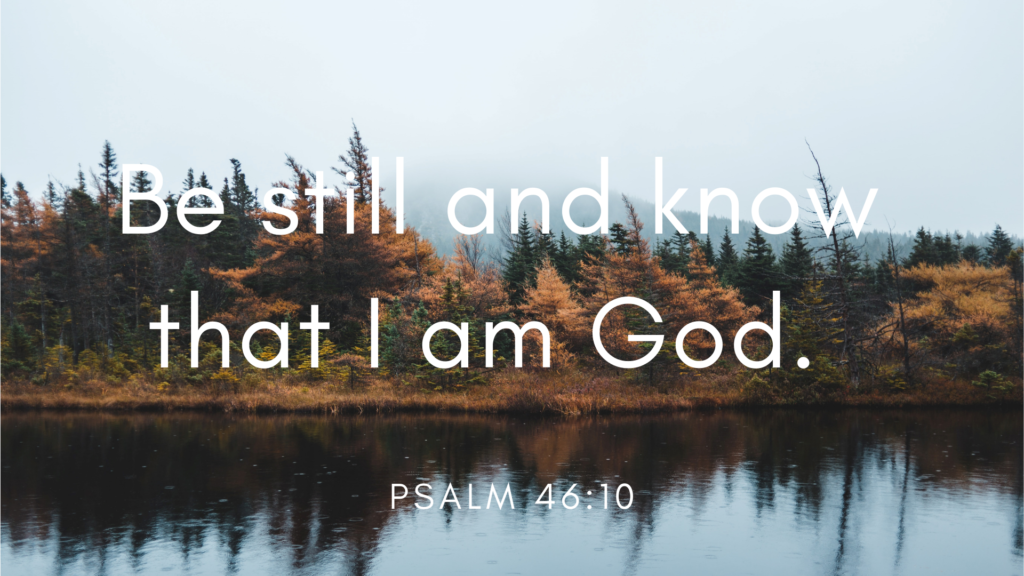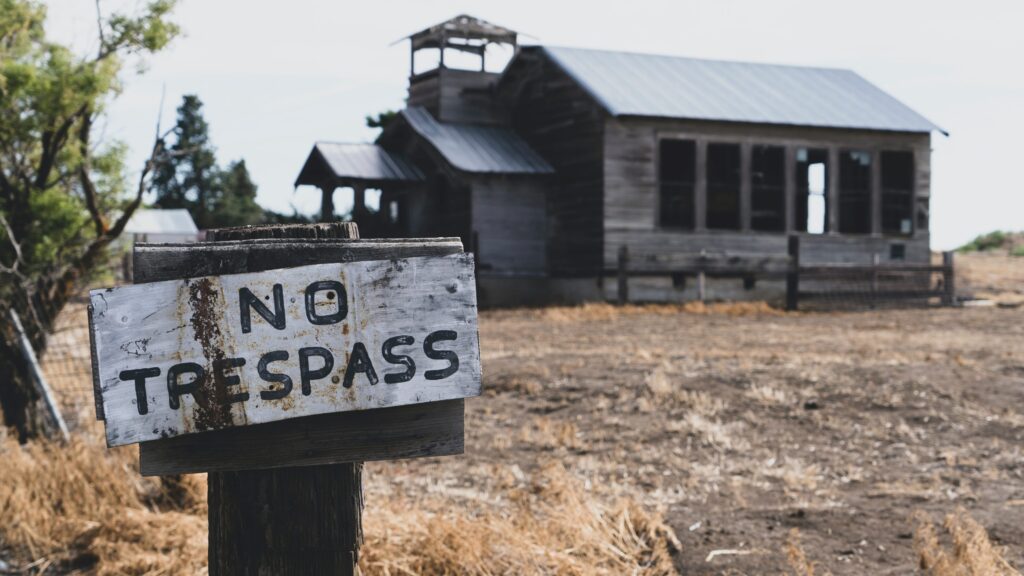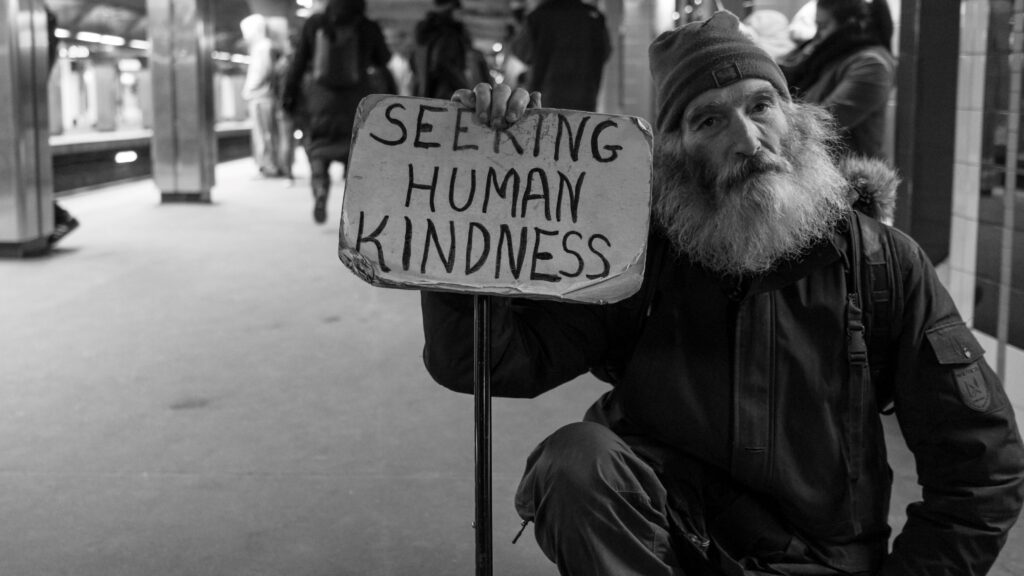
Psalm 46

Psalm 46 is a song of praise for God. It seeks to put God on display for us to understand better who He is and what He can do. The main idea of this Psalm is God is our refuge. God, our Creator, is our safety and security. He is our help in times of trouble – serious trouble.
In the first three verses disasters are described, “though the earth gives way, though the mountains be moved into the heart of the sea, though its waters roar and foam, though the mountains tremble at its swelling.” Yet, even in the face of cataclysmic events we have no need to fear. Why? Because God is our refuge. He is greater than the calamity. He is trustworthy. He is our help, a very present help. Nothing in this world – natural disaster, pandemic, social upheaval, politics – can overwhelm our God.
Not only is God our refuge, but He is also present with us. He is near to us, not far from us. We worship a God who is much involved in our lives. He has not forgotten you. Even in those moments when He seems at a distance, His voice is hard to hear, still He is with us. Even when the noise of “the nations rage, kingdoms totter, He utters his voice and the earth melts” (Psalm 46:6). This chapter doesn’t highlight God eliminating calamity. Instead calamity is happening throughout the psalm. Yet, through all the calamity God is more powerful and present. He is with us through it all, helping and strengthening us as we go.
What is on your mind today? What concerns you the most? Is there something you’re afraid of today? No matter what it is God is reassuring you that He is with you, He will help you, and you should trust Him. Take time today to be still and reflect on who God is and what He promises to do. Be still and know that He is God (Psalm 46:10). No calamity, pandemic or political strife will overcome the power and sovereignty of God. He is our refuge, our strength, our very present help in trouble.
Read more...

Hope is Here

I’m an optimist. I certainly see the upside in most situations. I’m glad that negative circumstances don’t seem to overwhelm me, though I get concerned quite often. I just try to find the positive in the negative, or the opportunity in the challenge. I would much rather see the world with optimist eyes than with pessimism, but not everyone is wired this way. I know many pessimists. I have friends and loved ones that always see the glass half empty. It’s not wrong to think optimistically or pessimistically unless your view denies reality. Often its what we choose to focus on most when facing real challenges that determines whether we are optimistic or pessimistic. I wonder which way you think? Read more…
Read more...

Jacob and Esau

Photo by Meritt Thomas on Unsplash
Then Jacob made this vow: “If God will indeed be with me and protect me on this journey, and if he will provide me with food and clothing, and if I return safely to my father’s home, then the Lord will certainly be my God.” Genesis 28:20
I love the speedy gonzalez lunch special! No matter what Mexican restaurant I visit that is always my meal choice. A beef burrito, taco, and beans. I sat there today with a friend ready to dig in. We meet once a month to read the Bible and share together. What is unique about this Bible study is that my friend doesn’t believe in God. Our conversation is always so good. We were hungry for some Mexican cuisine, and for the truth of God’s Word.
We had read the narrative in Genesis about Jacob and Esau, Isaac’s twin sons (Genesis 25-35) before we arrived. As we discussed the events in Jacob and Esau’s lives, we recognized a major observation. No one in this narrative seems to be any good. Esau understands God’s promise to his father Isaac, and certainly anticipates receiving the same blessing when he’s older, but he carelessly squanders it for a bowl of stew. His anger rises against his brother Jacob to the point he’s willing to murder him. Esau doesn’t show any faith in God and marries pagan wives.
Jacob, with the encouragement from his mom, deceives his brother twice and his father once. Jacob steals Esau’s birthright and his blessing. He’s angered his brother so much he has to go! Rebekah sends him to his kin in the east to find a wife, and to get away from Esau.
What do we learn about people from reading this narrative? No one is inherently good. Jacob and Esau came into the world at odds with one another. Rebekah and Isaac show favoritism in their family. When I look around the world today, even in my own life, I recognize that we aren’t inherently good either. We may want to be good. We may have good intentions. We may feel guilty when we’ve wronged someone else. But we always fall short of being good.
We are broken. We need help. We need to change.
As my friend and I discussed this idea, he asks, “So why did God bless them?” You see God made a promise to Jacob’s grandfather, Abraham, and his father Isaac that he would bless them, and they would be a blessing to all the families of the earth. God made the same promise to Jacob. That’s pretty great, but what did they do to earn that favor from God? The answer is nothing. God did not bless them and keep his promise to them because of their efforts or good behavior. Jacob didn’t do anything to earn God’s favor, but God gave it freely.
While Jacob was on the run from Esau to find a wife, he encountered God in a vision at a place called Bethel. He heard God’s promise and recognized that God was with Him. He vows to remain faithful to God since God is promising to be faithful to him. From that point on, Jacob had a relationship with God. Jacob trusted God, and God continued to bless him.
God blessed Abraham, Isaac, and Jacob because of His own grace and will. God so desires to bless all the families of the earth (even you and me) through this family that He continues to keep his promise no matter what. God remained with Jacob in spite of his shortcomings and deceitful character, but God didn’t let Jacob stay the same. God helped Jacob change and become the man God created him to be.
God keeps that same promise for us today. God sent Jesus, His son, to live, die, and rise again to forgive our shortcomings and give us eternal life. When we trust in God and follow His lead in our lives, He will change us too. He will make us into the men and women He created us to be. We haven’t done anything to earn God’s favor and blessing, but He certainly has given it freely.
Will you take it and trust God today?
Read more...

No Trespassing

Photo by Dan Meyers on Unsplash
We are made right with God by placing our faith in Jesus Christ. And this is true for everyone who believes, no matter who we are. For everyone has sinned; we all fall short of God’s glorious standard. Yet God, in his grace, freely makes us right in his sight. He did this through Christ Jesus when he freed us from the penalty for our sins. Romans 3:22-25
What’s wrong with the world today?
The truth is that I am what is wrong with this world. I have missed the mark of perfection. I haven’t even really come close to being what God created me to be in my character and in my conduct. Honestly, for every step forward I take a hundred steps backward! I have crossed the clear lines of right and wrong prescribed by our Creator. I have done what He has instructed us not to do, and I’ve neglected the things He has commanded. And in all of these bad choices, I’ve shaken my fist at God and blamed Him for all of it.
The Bible calls these actions and attitudes sin. And sin is our problem. Sin is the reason for broken relationships and broken lives. Sin is churchy word for the wrongdoing and rebellion against our Maker. And the Bible says that the wages, or consequences, for sin is death. Not just a physical death, but a spiritual death where we are separated from the walk and worship of God according to His initial design.
The Bible describes sin in a few different ways. These ideas can help us understand it better and when we are guilty.
Sin is often missing the mark. Imagine target practice with a bow and arrow. Robin Hood comes to my memory. The mark we aim for is the bullseye on the target. We pull, we aim, we fire, we miss! We might miss the target altogether, or we miss by a little to the left. Either way, we missed. The bullseye represents God’s holy perfection. No matter how hard we try, or how close we think we come, we cannot achieve his holy perfection. We always fall short. We need help.
Sin is also like trespassing. In fact, the Bible uses the word trespass often for sin. Trespassing is crossing a clearly defined line. If I take my trash across my property line and dump it in my neighbors’ yard, they would be angry with me. Rightfully so. I’ve crossed a line. Clearly it is wrong to throw my trash in someone else’s yard. Well, God has given us some pretty clear lines to follow. Do not steal. Do not murder. Do not lie. Do not commit adultery. Do not slander. There are a lot of lines, and each time we disobey these commands we’ve trespassed. Some are easy to follow but others are harder. Each of us has crossed a line at some point, and that makes us guilty.
Sin is rebellion. There are times when we disagree with God or ignore His commands. We would rather shake our fist at God and do things our own way because it feels better. In our selfishness and greed, we decide to do things that are contrary to what God has instructed. We knowingly do the wrong thing.
All of these are sinful actions and attitudes. None of them help us. Sin leaves us broken. Sin distorts God’s design, damages our relationships, and ultimately destroys our souls. We obviously recognize something is wrong with this world. The Good News is that God has made a way for us be restored and forgiven by His great love for us. Jesus forgives us our sin when we repent and believe in Him. Jesus resolves our sin problem and has promised to put an end to sin once and for all.
Read more...

Go to the Well

Photo by Matt Collamer, Unsplash
Jacob’s well was there; so, Jesus, wearied as he was from his journey, was sitting beside the well. It was about the sixth hour. A woman from Samaria came to draw water. Jesus said, “Give me a drink.” John 4:6-7
Living near a well is important. Wells are deep holes that penetrate the water table beneath the surface and provide water for drinking and other uses. For the traveler coming a long distance, the well was a place to be refreshed. For the thirsty, the well supplied a much needed provision. For the local homeowner, the well was a routine place to visit in the community. People came to wells because they needed water.
In John 4, Jesus and his disciples are traveling to Galilee from the region of Judea. Jesus chose to go through Samaria when most Jews chose to avoid that place. After some time, they were tired, thirsty and hungry. Jesus sent the disciples into the city to get food, and he stayed by the well. As he sat there under the heat of the noonday sun, a woman came to the well by herself to draw water. Jesus asked her for a drink, and what follows is an incredible story of spiritual transformation! Jesus took interest in the life of this woman when no one else would. Jesus shared truth with her, and by the end of their conversation she believed in Him, the Messiah.
I encourage you to read the whole chapter. There are so many practical truths that help us relate to one another in more gracious, loving, and merciful ways. But I want to draw your attention to two key ideas.
First, Jesus went to the well. Jesus could have traveled a completely different way to get to Galilee. It was rare for a Jew to travel willingly through Samaria anyway. But Jesus had a purpose. Jesus knew he needed to go through Samaria. He was willing to sit at the well under the uncomfortable sun and start a conversation with a social outcast. Jesus knew this woman would be coming to the well. So, he intentionally went to the well.
Where are the wells in your community? No, I am not talking about the literal wells in backyards. I am talking about the places where people go to receive what they need. I consider soup kitchens, rehab centers, clothes closets, schools, hospitals, daycares, restaurants, coffee shops and recreation centers as wells. I am sure there are more. People go to these places to satisfy a perceived need in their lives. People are there. Often you are there, but are you there intentionally to help someone else with a greater need?
Second, the woman went to the well because she needed water. Jesus knew that she needed something more than a drink – she needed lifesaving water – she needed Jesus. This woman was not coming to meet Jesus. She was not going to the synagogue to confess her sins. She came to the well at noon when no one else should be there to get water. She received more than she expected. She met Jesus, who came to meet her. Jesus cared for this woman and shared the truth about himself with her. He changed her life. “Come, see a man who told me all that I ever did. Can this be the Christ?” she proclaimed (John 4:29).
Jesus intentionally went to the well to help someone with a greater need than the well could provide. Have you considered which well you should intentionally visit to help someone with a greater need? Perhaps you work in a well – police department, fire department, business, restaurant, school, library, nursing home (the list could go on) – and today as you go to work, would you pray for an opportunity to help someone meet Jesus? Its time to intentionally go out of your way to visit a well. Connect with someone who needs Jesus.
Read more...
